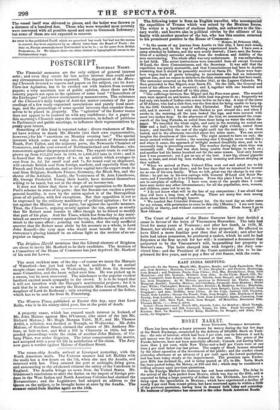The following letter is from an English traveller, who accompanied
the expedition of Texans which was seized by the Mexican forces. The writer is a barrister of studious habits, not unknown to the lite- rary world ; and known also in political circles by the alliance of his family with another member of the bar, who has this session returned to his prominent position in the House of Commons- " Mexico, 3d February 1842. "In the course of my journey from Austin to this city, I have seen much, learned much, and in the way of suffering experienced much. I have seen a camp attacked by Indians, and the men nearly starved; I have seen the forma- lities of a military surrender arising from the weakness and debility of the men surrendering. The whole affair was very unfortunate. It was undertaken in bad faith. The secret instructions were concealed from all except General M‘Leod, the three Commissioners, and the Secretary. It was said that the expedition was purely mercantile, and that Commissioners had been to Austin promising that it should be peaceably received at Santa Fe. There were four- teen wagon-loads of goods belonging to merchants who had no indemnity mainst loss, and no reason to disbelieve the false statements that had been made. The surrender occurred on the 6th October 1841, at the Lagnne Coloredo. We then proceeded to San Miguel, near Santa Fa. On the 16th, the General and most of his officers left us mounted ; and I, together with one hundred and sixty persons, was marched off to this place. "Our sufferings between San Miguel and the Paro were great. The wearied men were speared on and beaten, and little food was given to us ; frequently we had only two heads of Indian corn a man to live on for a day. A man of the name of 111,Alister' who had a club-foot, was the first shot for being unable to keep up. On the 30th October, we reached Bay Christobal. That night was bitterly cold, and it snowed : I had only one blanket to put around me; and when I awoke in the morning, all the men looked like logs, and were covered with snow two inches deep. In the afternoon of the 31st, we commenced the cross- march of the long Porneda, so called from there being no water the whole dis- ce. We travelled the whole night, and early in the morning we rested one hWer and a half; travelled the whole day until eight o'clock, rested three hours ; and travelled the rest of the night until ten the next day ; we then halted, and in the afternoon travelled about five miles more. You can never imagine the dreariness of this march. The night seemed to have no end; the moon seemed without motion ; the morning-star I thought never would rise ; and when it came, the approach of twilight seemed dreadfully slow, and to be unusually long in preceding sunrise. The weather during the whole time was unusually cold. One man was shot, being unable from fatigue to walk on ; and another bad his brains knocked out for the same reason. God only knows how I was preserved; yet I got on one of the best. I saw big, almost gigantic men, in tears, and stout big men walking and moaning and almost sleeping as they walked. "When we arrived at Pam, Colonel Elias sent out and asked me to his house. Be gave me a bed there ; and for four days that we remained he treated me as one of his own family. When we left, great was the change in my con- dition: be put me in his own carriage with General M•Leod and Senor Na- varro, and 1 travelled in it to Chihuahua. From this place I have had no rea- son to complain of suffering: I have seen more of the people than I could have seen under any other circumstances; for all the population, men, women, and children, came out to see us.
" I do not know what will be the fate of my companions : I am afraid that they will have a long time of suffering. There are many fine men among them whose fate I exceedingly lament. "We reached San Cristobal February 1st. On the next day an order came for my release, with permission to come to this city (Mexico.) I am now here, perfectly at liberty, and without restraint or condition. From hence Igo to


























 Previous page
Previous page